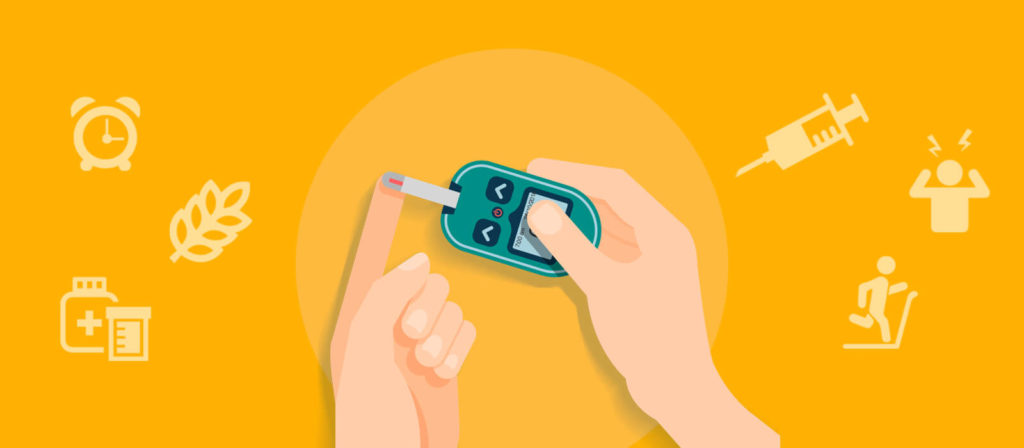Disclaimer: This article includes general information only and is not to be substituted for medical advice, diagnosis, or treatment. Always work with a doctor to address medical concerns.
Though Type 1 and Type 2 diabetes are related, they’re very different diseases. Type 1 diabetes is an autoimmune disease in which the pancreas is unable to produce insulin. Consequently, those who have it are dependent on insulin shots. By contrast, those with Type 2 diabetes do produce insulin, but their cells have built up a resistance due to an excess of it in the body. As a result, sugar builds up in the blood.
Type 2 diabetes is a growing epidemic in the United States. The State of Obesity project reports that 29 million Americans currently have it, while the U.S. Centers for Disease Control and Prevention projects that 1 in 3 will suffer from it by the year 2050. Fortunately, the epidemic can be reversed. Unlike Type 1, the risks for Type 2 diabetes are largely within our control, and by avoiding them, we can often prevent or reverse the disease.
Address the Condition, Not Just the Symptoms
Type 2 diabetes is often a chronic disease, but it doesn’t have to be. Granted, some risk factors can’t be avoided, including genetics and being over the age of 45. But many of them can: Obesity, high blood pressure, a high-stress lifestyle, a diet high in processed foods and refined sugars, smoking, and living a sedentary lifestyle are all preventable.
If you do develop Type 2 diabetes, you can even reverse it by changing such habits and increasing your insulin sensitivity again. Your body is an amazing creation with an incredible ability to heal if you give it the proper tools. Consider adding these particular tools to your diabetes-fighting arsenal:
1. Foods that don’t force insulin production

Eating a healthy and balanced diet is one of the most important steps in preventing and reversing Type 2 diabetes. As I mentioned above, processed foods that are high in refined sugars and carbohydrates, unhealthy fats, and poor-quality proteins significantly increase your risks of poor health, including problematically high insulin sensitivity.
For instance, refined sugars force your body to produce more insulin, which causes your cells to become more resistant to it. To lower that resistance, fill your diet with vegetables; healthy fats such as olive oil, avocado, and nuts; and healthy proteins such as grass-fed beef, pasture-raised poultry and wild-caught fish. This not only lowers your blood sugar to prevent diabetes, but it also fuels your body to function better overall.
2. Regular physical movement

You can also lower your blood glucose levels by exercising regularly. Moving your body uses up excess insulin and improves insulin sensitivity in your cells. Even 30 minutes of movement a day can greatly decrease your risk of Type 2 diabetes, especially if your current lifestyle is chronically sedentary.
Getting your body moving and eating more healthfully also help you address another significant risk factor: being overweight. The number you see on the scale does not always indicate true health, but more than 90 percent of people with Type 2 diabetes are overweight or obese. Eating well and moving more will promote healthy, natural weight loss.
3. Effective, routine stress reduction

Stressing over your health risks is natural, but stressing too much — yes, about anything — only adds to those risks. When you’re stressed, your body produces fight-or-flight hormones such as adrenaline and cortisol that raise your blood glucose levels to boost your energy. Chronic stress means chronically elevated blood glucose, and consequently, a higher risk of Type 2 diabetes.
By focusing on lowering your stress levels, you can reverse its effects on your blood sugar and insulin sensitivity. Adopt a meditation routine, participate in activities you find relaxing, and socialize with friends and family more often. In some cases, long-lasting stress might have a deeper underlying cause. If you need help reducing your chronic stress, consider reaching out to a counselor.
You can take many steps on your own to prevent or reverse Type 2 diabetes and improve your overall health. However, it’s important to also work one-on-one with a doctor to monitor your health and address personalized health issues throughout the process. A functional medicine doctor, holistic nutritionist, or naturopath can help you develop a plan to eat better, move more, and relax so you’ll have a better chance at preventing Type 2 diabetes.






